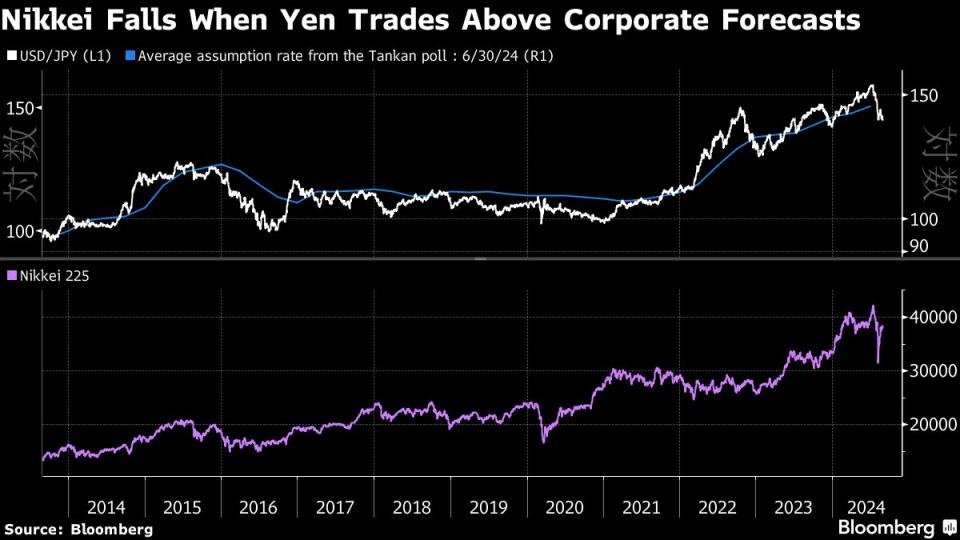Yen’s Rapid Advance Pressures Earnings Once Thought Easy to Beat

(Bloomberg) -- The yen’s recent rally has taken it past levels many Japanese companies use to forecast their earnings, raising the risk of exporters cutting their guidance and hampering the stock market recovery.
Most Read from Bloomberg
Dense Cities With Low Emissions Suffer Most From Air Pollution, Study Finds
Intergenerational Housing Could Help Older Adults Combat Loneliness
As Rural Hospitals Shutter Maternity Wards, Urban Ones Follow
With stronger signals coming from the Bank of Japan and Federal Reserve on monetary policy, the yen has gained 3.5% against the dollar since the end of July, with some analysts now forecasting it to hit 135 by the end of the year.
That’s beyond the average assumption of 144.77 indicated in the BOJ’s latest quarterly Tankan poll of more than 9,000 enterprises. It’s also stronger than the assumptions of large exporters such as Toyota Motor Corp. and Honda Motor Co.
Analysts have estimated that every 1-yen rise against the dollar will lead to a 0.4%-0.6% drop in profits of Japanese firms. The currency had traded stronger than 144.77 for much of this week and is far from the multi-decade weak point of 161.95 struck in early July.
“Once the yen reaches the low 140s, some companies will likely revise down guidance,” said Kohei Onishi, a senior investment strategist at Mitsubishi UFJ Morgan Stanley Securities Co. History suggests the Nikkei 225 Stock Average tends to fall when the yen is trading higher than corporate forecasts, he added.
After the global market rout in the first week of August, investors have regained confidence in US stocks as economic indicators and remarks by Fed officials suggest a soft-landing scenario. Japanese stocks on the other hand, are lagging behind the US, with the S&P 500 Index rising 1.3% in August while the Nikkei fell 1.9%.
“Concern over the yen strengthening beyond 140 is the biggest cause of the recent gap between the US stocks and Japanese stocks,” said Nobuyuki Kashihara, managing executive officer at Marusan Securities. “We have not seen the yen in the 130s for a while, so that would have a chilling effect on investor sentiment.”
Until recently, yen assumptions by Japanese exporters had been much stronger than the going rate, giving them room to beat their own earnings expectations as the currency depreciated.
“Earnings are no longer looking conservative with the yen rising rapidly in August,” said Hiroshi Namioka, chief strategist at T&D Asset Management Co. in Tokyo.
Automobiles are among the sectors that carry downside risks when the yen strengthens against the dollar as it deflates overseas sales. For example, Toyota assumed the yen at 145 for this fiscal year while Honda assumed 140. When the yen hovered at around 161 against the dollar earlier in the year, earnings forecasts were deemed too conservative and therefore had strong upside potential.
Lowball Profit Guidance Provides Upside in Japan: Taking Stock
Nevertheless, some sectors vulnerable to the exchange rate are in a favorable inventory cycle, such as electronics, and may continue to see earnings upside on the basis of strong unit sales, said Namioka.
Looking ahead, whether concerns around the yen calm down will depend on the US soft-landing and economic indicators, and Fed actions will be closely watched, said Masahiro Ichikawa, chief market strategist at Sumitomo Mitsui DS Asset Management.
“If the yen rapidly gets stronger again, that will be a surprise and serve as a strong headwind for Japanese stocks,” he added.
--With assistance from Hideyuki Sano.
Most Read from Bloomberg Businessweek
Hong Kong’s Old Airport Becomes Symbol of City’s Property Pain
Far-Right ‘Terrorgram’ Chatrooms Are Fueling a Wave of Power Grid Attacks
©2024 Bloomberg L.P.
